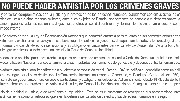In January 2012, Guatemalan General Ríos Montt was formally charged with genocide for ordering massacres during the genocide in Guatemala. Only a year later, justice for victims has come under threat: Guatemalans and the international community are gravely concerned that the Constitutional Court could be pressured into granting amnesty.
On Thursday, December 20, ICTJ joined colleagues and partners in the field to send a strong message to Guatemala: architects of atrocity must be held to account.
Through a newspaper advertisement placed in the Guatemalan newspaper Prensa Libre, and declared "On the crime of genocide, there can be no confusion: there can be no amnesty, nor any other impediment to effective criminal prosecution."
The text of the ad is below (translated from the original Spanish):
The signers are organizations and individuals committed to justice and the protection of fundamental human rights. We applaud the efforts in Guatemala, led by the Public Ministry, to prosecute former high ranking military authorities, including former heads of State, for the crimes of genocide and crimes against humanity during the internal conflict. These efforts represent an important example for other national justice systems in other Latin American countries and around the world that also face the challenge of obtaining justice for the gravest of crimes in the context of internal conflicts.
As part of the peace process, in 1996 at the end of the conflict, Guatemala´s Congress passed the National Reconciliation Law that provided amnesty for many of the crimes committed during the conflict, followed by another law that rescinded all earlier amnesties. Guatemala’s amnesty explicitly excludes genocide, forced disappearance and torture, among other non-amnestiable and imprescriptible international crimes, in accordance with fundamental elements of international law and its binding obligations for the Guatemalan State. This article of the law has been applied correctly by Guatemala’s courts at all levels, including the Constitutional Court, for the past 16 years.
Currently, however, we are deeply concerned by the possibility of inappropriate pressures that could create a climate in which the Constitutional Court feels pressured to provide amnesty to those who have been formally charged with the crimes of genocide and crimes against humanity, despite its own jurisprudence.
On the crime of genocide, there can be no confusion: there can be no amnesty, nor any other impediment to effective criminal prosecution. Since at least 1948, genocide has been recognized as a crime under international law, whether it be committed in times of war or peace, and has no statute of limitations. The International Convention on Genocide, ratified by Guatemala in 1950, explicitly obliges States to try those persons charged with genocide, be they pubic officials, rulers or private individuals, and to apply an effective penalty if they are found guilty. Since 1973, this crime has been part of Guatemala´s Criminal Code. The other international crimes exempted from amnesty in Article 8 of the National Reconciliation Law have been treated similarly. There is no possible violation of the legality principle in these processes.
Guatemala can be an example for the world of dignity and justice, or of shame and impunity.
This is not the moment for Guatemala to retreat from its international commitments, nor to isolate itself from the international community through actions that will be seen as a serious setback for the rule of law and human rights in the region.
Signed,
Philip Alston, Professor of Law, New York University; former UN Special Rapporteur on Extrajudicial Executions Asistencia Legal por los Derechos Humanos (ASILEGAL), México Almudena Bernabeu, Director, Transitional Justice Program, Center for Justice and Accountability Santiago A. Canton, Robert F. Kennedy Center for Justice and Human Rights. Comisión Permanente de Derechos Humanos de Nicaragua (CPDH) Due Process of Law Foundation, DPLF Helen Duffy, Director, Human Rights in Practice (Stichting) Federación Internacional de Derechos Humanos Laurel Fletcher, Director, and Roxanna Altholz, Associate Director, International Human Rights Law Clinic, University of California, Berkeley School of Law Fundación de Estudios para la Aplicación del Derecho (FESPAD), El Salvador Fundación Construir, Bolivia David Hollenbach, SJ, Director, Center for Human Rights & International Justice, Boston College Human Rights Clinic, University of Texas Law School Instituto de Defensa Legal, Perú Viviana Krsticevic, Director, CEJIL Elisa Massimino, Executive Director, Human Rights First Diane Orentlicher, Professor of Law, Director of the War Crimes Research Office, American University – Washington College of Law; and former UN Independent Expert on Combatting Impunity David Tolbert, President, International Center for Transitional Justice Washington Office on Latin America, WOLA
